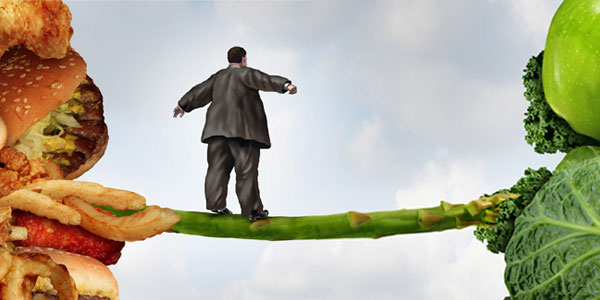
For sauerkraut’s sake, teach our children right!
- Schalk Mouton
COLUMN: Sauerkraut. That is how I start my day. Fermented cabbage leaves served with two boiled eggs and a slice of juicy cucumber on the side.
When it comes to food, I am my own man. I eat what I like … and I like to eat what my wife tells me to eat.
My new philosophy on food started eight years ago, when I moved in with my wife. Within the first six months, I lost 20kg. I was proud of myself. I paddled and ran regularly, and had supernatural self-control when it came to food. Naturally, then, it came as a surprise when, three years later, my wife casually dropped into conversation that, unknown to me, she had put me on a Weigh-Less diet.
A diet! What the Fungi! Never in my life would I ever have considered going on a diet! What a load of nonsense. I would rather eat bugs and die.
Slowly, but surely the wheel turned. It crept in, like a stray kitten found outside your front door on a cold rainy night that ultimately makes its way into your bedroom and then pushes you off the bed.
The food I ate became unrecognisable. No longer the McDonald’s double-thick chocolate milkshake on a Friday night. Visions of a greasy corner café Russian and chips for lunch faded slowly. Then, one day, I had forgotten how warm, freshly baked bread with strawberry jam smells. Does Woolies still sell Sticky Toffee pudding?
A constant tension surrounds eating habits in our household. In short, my wife would say we are “Banters”. I am still under the impression that I eat what I like. Every now and then, my wife declares a “100-day challenge” to “eat only from the Green List” and, on the nights when I order a chocolate brownie for dessert at a restaurant, the cat has no competition for my side of the bed.
Big Food
Food has become complicated. Gone are the days when a good meal consisted of a simple slice (or eight) of freshly baked Spar bread with margarine (butter was a poison) and a thick layer of peanut butter and Lyle’s Golden Syrup.
What should you eat? What do you avoid? Is this on the Green List? Can we use coconut oil to cook with or is it poisonous? High carbs, low fat? Vegan or “clean” foods? Should you eat food that grows above the ground or below? Is it butter or margarine – or both – that was concocted in the cauldrons of hell?
Eating has become big business. Everybody has either an agenda or a book to sell. Nothing is what it seems anymore. In the past, you trusted either a doctor or the You magazine for your nutritional information. These days, everyone with a Facebook account is an expert. You don’t know who or what to believe. All I know for sure is that – at least for now – my peanut butter and syrup sandwich is something that will stay locked up in the sweet distant memories of a fat and happy teenager.

Gastronomy on a knife’s edge
Growing up in a single-parent household, my brothers and I were left to fend for ourselves when it came to food. Except for dinner, what and when we ate was left up to us. So we didn’t eat breakfast or pack school lunches, but then wolfed down a loaf of the now dearly departed peanut butter and syrup sandwiches at lunchtime after school.
We quickly became the fatties in primary school, and while I managed to control my weight through taking up sports in high school, my brother became morbidly obese. Throughout his life, he was the target of constant ridicule and incredulous stares. He was always uncomfortable. At the age of 12, he outgrew his school uniform (later, I did too).
After numerous diet attempts, my brother decided on bariatric surgery two years ago. He lost 150kg and now weighs a normal 90ish kilograms. Not believing in quick fixes, I was deeply sceptical when I heard he was going for a surgical intervention. But seeing him now, in his mid-40s, enjoying a new life as if he were 25 years younger, makes it all worthwhile. Regaining his ideal weight, and his life, cost him close to R1,5 million. The pain he went through was hell, and he now has to stick to literally bite-sized portions, as overeating could be fatal. (Read his story below).
Had we been taught to eat better, our lives might have turned out differently. Not for a second am I blaming my mother. She cooked wonderfully sweet and greasy meals and did a great job raising her sons, but she had no idea about the importance of good nutrition. There was never anything close to nutritional education. Only now, with the help of a spoonful of sauerkraut each day, do I realise how critical it is to eat right and, more importantly, to teach our children to eat right.
The handful of multinational corporations that monopolise the global food system love the fact that there is so much confusion. They gorge on our perplexity, sucking up the profits while whittling the quality of our food and force-feeding us carefully constructed half-truths.
For over 40 years, we have been sold the “low-fat” fad. But to supplement the natural fats stripped from food, it was loaded with all kinds of hidden sugars. Since the ‘80s, when the American Government’s Dietary Guidelines began recommending low-fat diets, obesity has skyrocketed globally. It has cost children like my brother and I dearly.
Nutritional baloney
The basis for the low-fat diet was the Seven Countries Study in the ‘70s by American scientist Ancel Keys, who went out to prove that saturated fat caused heart disease. At the same time, British nutritionist John Yudkin opposed this, saying in his book Pure, White and Deadly, that sugar was the poison, not fat. But while Yudkin was a traditional scholar, quietly going about his science and research in a reserved and gentlemanly manner, Keys promoted his ideas aggressively and shouted down anyone who opposed him. Yudkin was buried. Sugar won the fight.
This confusion over nutrition makes a strong case for responsible scientists to raise their voices over the noise of Big Food. Scientists, communicators, journalists, politicians and teachers all have a responsibility – to kids like my brother and I and millions more – to stand up, communicate effectively, teach our children – and their parents – to eat right.
For an informative guide on good nutrition see: https://www.hsph.harvard.edu/nutritionsource/
Inside bariatric surgery for obesity
(*) By Hannes Mouton
“Studla”, “Oros”, “Fridge”, “Michelin Man”, “Vetgat” – just some of the names I’ve been called my entire life. Imagine walking down the aisle of a mall and being the centre of attention – toddlers stare, they stop, point and say, “Mom, look at that fat man!” Worse is walking past people and you feel them staring – confirmed when you turn around.
I have been obese for 43 years of my life. For the most part, the term “morbidly” was attached to it. Weighing in at 250kg and being 1,83m tall, I had a body mass index (BMI) of 76. Normal males should maintain a BMI of approximately 25! Coupled with obesity, I had other complexities: hypertension, gout, and sleep apnea.
Clothing was an issue. Since third grade, I could not fit into any standard school uniform. I had to make do with a regular shirt and grey pants, when all the other children wore “safari pakkies” [safari suits]. I was the centre point on the class photograph. As an adult, I had to purchase clothes at Big & Tall (10XL shirts) tailored to fit me.
How did I get to that point?
A multitude of reasons: Slow metabolism; over-eating; lack of exercise; incorrect eating habits; and psychological reasons. You get to a point where you feel that you are so far over the edge in terms of your weight, you might as well continue to enjoy the next doughnut (Come on, feed your face!).
This lifestyle was hell. I tried everything to lose weight, every diet – Banting, blood type, etc. I took hormone injections at 16 and lost some weight but gained more back the moment it stopped. At 35, I went on a stringent calorie intake diet with strenuous exercise. I lost 70kg, but without changing the diet, I regained the weight. Five years later, I tried it again, cutting back more on calories and this time losing 50kg. Again, two years later, the weight was back.
Turning point
The last straw was a December holiday going down to the coast. Again, I suffered the annual oedema – swelling of the legs due to water retention from travelling. This time, it was so bad I could not stand up. I realised that continuing down this road, I would surely end up dead. My worst fear: How will I fit in a coffin? And how will they carry my coffin? I had seen it happen at my aunt’s funeral. I didn’t want to do that to my children!
At the age of 43, I opted for bariatric surgery. Only when I enrolled in the programme did I become aware of the importance of nutrition. This changed my outlook on food and exercise. Food provides energy and vitamins to the body to function, as opposed to my original view that it was there to enjoy! I learned this from a dietitian and psychiatrist in my middle-age.
Reflecting on my life (and without blaming my parents), I think they could have done a better job managing the situation when they noticed their boy ballooning in grade 3!
Weight as a set point
The other fact I learned while preparing for the bariatric surgery was the function and working of the thyroid gland, which manages metabolism. If a person has maintained a particular weight, the thyroid registers this weight as a set point. Once the diet begins and the person starts losing weight, when 10% of weight is shed, the thyroid gland thinks the person is ill and starts slowing the metabolism to maintain the set point. Thus, the weight increases again. To lower the thyroid’s set point, excess weight must first be lost and maintained for three years. But if there is more weight to be lost than the 10% trigger necessary for the thyroid to act, then you have a problem! Thus, if one exceeds a certain point of obesity, one will never be able to shed the weight with a normal dietary intervention.
A new life
Since my bariatric surgery, I have lost 160kg in two years, experiencing a new life! I can enjoy all the things “normal” people do. I have extended my life and all those abnormalities coupled with being morbidly obese have magically disappeared. I walk past people who look like I used to and my heart goes out to them – they don’t deserve the hell they experience.
Note that bariatric surgery is not a magic wand that makes the weight disappear. It is a long and difficult process that requires serious lifestyle changes, and the commitment and dedication to maintain a healthy lifestyle.
- Schalk Mouton is a Senior Communications Officerin Wits Communications and Editor of Curiosity. (*) Hannes Mouton is his brother.
- This article first appeared in Curiosity, a research magazine produced by Wits Communicationsand the Research Office.
- Read more in the sixth issue, themed: #HungerGames where our researchers and academics unpack the latest research on food security, food science, food politics and governance, nutrition and food-related issues such as obesity, diets, breastfeeding, and body image.

